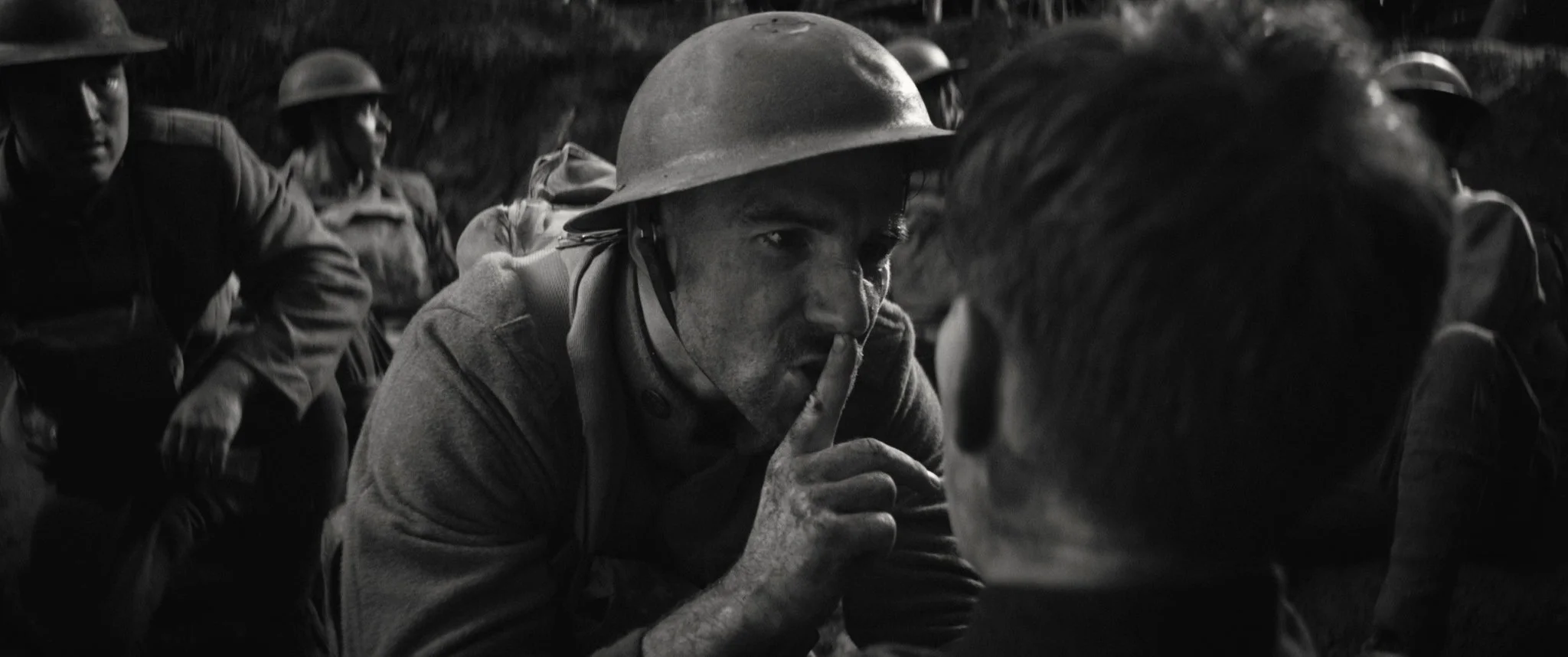Foxhole: Bullets, Debates and Endless Recurrence in this Trio of War Tales
By Liam Lacey
Rating: C+
“You can't say civilization don't advance,” observed old-time humourist Will Rogers. “In every war they kill you in a new way.”
The quote could be a motto for the film, Foxhole, a war film that takes place in three different eras, with the same small cast playing soldiers on the frontlines in three different conflicts - the American Civil War, World War I and in modern day Iraq.
Written, directed, edited, and orchestrated by 22-year-old wunderkind Jack Fessenden, the film opens with a striking overhead shot of men’s bodies lying on the ground, forming a kind of mosaic of bent limbs.
Alex Hurt calls for quiet on the Western front in the WWI chapter of Foxhole.
Suddenly, one of them pulls himself to his feet, and moments later, is engaged in a hand-to-hand fight to his death with a Black soldier in a Union uniform. The wounded victor, named Jackson (Motell Gyn Foster), stumbles on a cluster of fellow Union soldiers hunkered in a trench.
They are Clark (Cody Kostro), Conrad (Angus O'Brien), Morton (Alex Hurt) and Wilson (James Le Gros), who will be reincarnated in the subsequent wars. The elder Wilson serves as the recurring conscience of the group in debates about individual survival vs collective responsibility.
In the Civil War episode, Jackson, who desperately needs medical aid, says that the enemy is about to overtake them and they must move. Meanwhile, the men debate whether they should risk taking him to a medic five miles away.
In the second World War I episode, shot in black and white, the interloper is a German soldier (Alex Breaux) who attempts to surrender, offering vital information, though some think he should be killed immediately before he betrays their position.
Episode three finds our five soldiers in a Humvee, driven through the Iraqi desert by a woman named Gale (Andi Matichak) when they fall under attack. Wilson is badly wounded, incapable of walking without help. The enemy fire intensifies as Sergeant Jackson struggles to determine whether to wait for help or attempt to move their wounded comrade to higher ground.
Visually, Fessenden keeps the budget low and maintains a claustrophobic atmosphere by limiting the visual field with a backdrop of fog in the Civil War episode, monochrome night skies over the trenches in the Great War, and blinding sun in Iraq.
Thematically, he draws fairly superficial attention to race and gender mores. The Black soldier Jackson fights for his freedom in the Civil War, is not allowed to carry a weapon in the Great War, and is a commander sergeant in the Iraq episode. The sole woman character, Gale, is a driver in Iraq, and is seen in a brief vignette in the Civil War episode as a wife waiting for her soldier husband.
Multi-threat director Fessenden deserves credit for the film’s ambitious concept. But Foxhole often feels on-the-nose and without escalation of intensity of any effective story. Even if the theme is war’s futile repetition, there are more concise ways to make the point. The example that comes to mind is the 1970 Motown hit, War by Edwin Starr and The Undisputed Truth: “War, huh,(good God, y’all) what is it good for? Absolutely nothing, just say it again.”
Foxhole. Directed and written by Jack Fessenden. Cast: James Le Gros, Motell Gyn Foster, Alex Hurt, Angus O’Brien, Cody Kostro, Andi Matichak, Alex Breaux, Asa Spurlock. Foxhole is available on video-on-demand on June 3.


